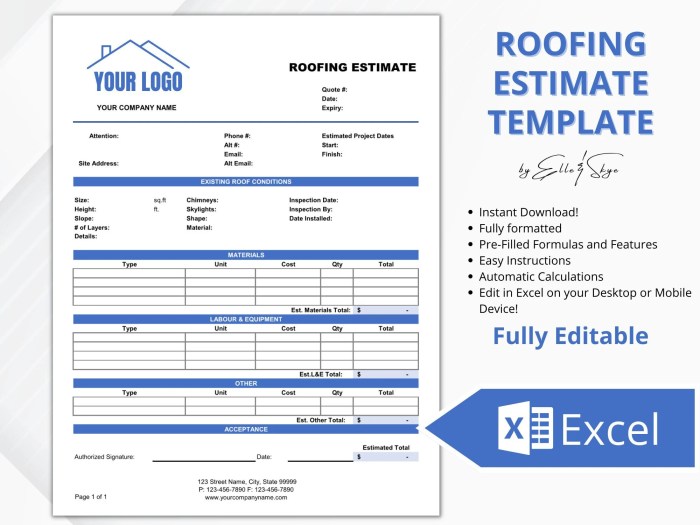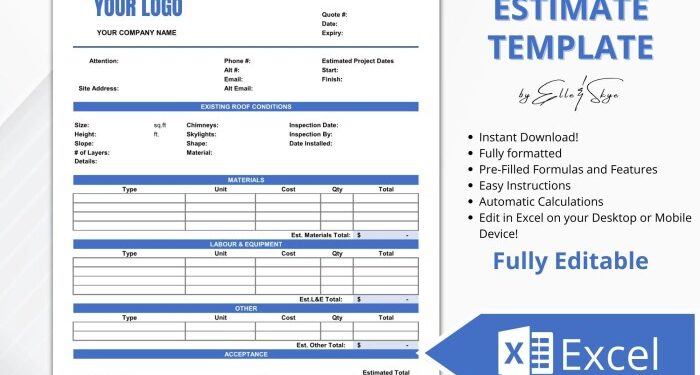Kicking off with Roofing and Siding Quotes: How to Avoid Overpaying, this opening paragraph is designed to captivate and engage the readers, providing a clear insight into the world of roofing and siding quotes.
Exploring the factors influencing quotes, researching and planning tips, understanding quotes and estimates, and effective negotiation strategies, this topic covers essential information to help you navigate the process effortlessly.
 When it comes to receiving quotes for roofing and siding projects, there are several key factors that influence the overall cost. Understanding these components can help you avoid overpaying for your home improvement needs.
When it comes to receiving quotes for roofing and siding projects, there are several key factors that influence the overall cost. Understanding these components can help you avoid overpaying for your home improvement needs.
 When it comes to negotiating with roofing and siding contractors, there are several effective tactics you can employ to potentially get a better deal. One common approach is leveraging competing quotes to negotiate a lower price or better terms. Knowing when and how to negotiate can make a significant difference in the final cost of your project.
When it comes to negotiating with roofing and siding contractors, there are several effective tactics you can employ to potentially get a better deal. One common approach is leveraging competing quotes to negotiate a lower price or better terms. Knowing when and how to negotiate can make a significant difference in the final cost of your project.
Factors Influencing Roofing and Siding Quotes
 When it comes to receiving quotes for roofing and siding projects, there are several key factors that influence the overall cost. Understanding these components can help you avoid overpaying for your home improvement needs.
When it comes to receiving quotes for roofing and siding projects, there are several key factors that influence the overall cost. Understanding these components can help you avoid overpaying for your home improvement needs.
Size of the Project
The size of the roofing or siding project plays a significant role in determining the cost of the quote. Larger projects that require more materials and labor will naturally come with a higher price tag. Contractors will take into account the square footage of your roof or the amount of siding needed to calculate the overall cost.Materials Used
The materials used for roofing and siding can vary greatly in terms of quality and cost. Higher-end materials such as metal roofing or fiber cement siding will typically result in a higher quote compared to more budget-friendly options like asphalt shingles or vinyl siding. It's essential to consider the durability and aesthetic appeal of the materials when making your selection.Labor Costs vs. Material Costs
Labor costs and material costs are both significant contributors to the overall quote for roofing and siding projects. Skilled labor is necessary for proper installation, and experienced contractors may charge higher rates for their expertise. On the other hand, the quality and type of materials used will also impact the final price. Finding the right balance between labor and material costs is crucial in ensuring you receive a fair and accurate quote for your project.Research and Planning
Researching and planning are crucial steps when it comes to getting quotes for roofing and siding projects. By taking the time to gather information and understand the scope of work needed, you can ensure you are not overpaying for these services.Researching Local Roofing and Siding Companies
- Start by asking for recommendations from friends, family, or neighbors who have recently had roofing or siding work done.
- Check online reviews and ratings for local companies to get an idea of their reputation and quality of work.
- Verify that the companies you are considering are licensed, insured, and have good standing with the Better Business Bureau.
Importance of Getting Multiple Quotes
- Getting multiple quotes allows you to compare prices, services offered, and warranties provided by different companies.
- It can help you identify any outliers in pricing and avoid overpaying for the same scope of work.
- Remember that the lowest quote may not always be the best option, as quality and reliability should also be taken into account.
Planning Ahead for Your Project
- Plan your project well in advance to avoid rushed decisions and potential mistakes that could lead to unnecessary costs.
- Consider the materials you want to use, the timeline for the project, and any additional services you may require.
- Having a clear understanding of your needs and expectations will help you communicate effectively with the companies providing quotes.
Understanding the Scope of Work Needed
- Before reaching out to companies for quotes, Artikel the specific work you need to be done, including repairs, replacements, or upgrades.
- Provide detailed information about the size of the project, existing materials, and any challenges that may affect the cost or timeline.
- By being clear about your expectations upfront, you can ensure that the quotes you receive are accurate and tailored to your project's requirements.
Understanding Quotes and Estimates
When it comes to the roofing and siding industry, understanding the difference between quotes and estimates is crucial in making informed decisions and avoiding overpaying for services. Deciphering and comparing different quotes effectively can help homeowners choose the best option for their budget and needs. Asking for a detailed breakdown of costs in the quote is essential to ensure transparency and avoid any surprises later on. Here are some tips on how to spot hidden fees or charges in the quotes:Difference Between a Quote and an Estimate
- A quote is a fixed price offered by a contractor for a specific project, while an estimate is an approximate cost that can change based on the actual work required.
- Quotes are more precise and legally binding, whereas estimates are more flexible and subject to adjustments.
- It is important to clarify with the contractor whether the document provided is a quote or an estimate to avoid confusion.
Deciphering and Comparing Quotes
- Compare the scope of work, materials used, and warranties offered in each quote to make an informed decision.
- Look for inconsistencies or vague language that could lead to misunderstandings later on.
- Consider the reputation and experience of the contractor when evaluating quotes to ensure quality workmanship.
Importance of Detailed Breakdown of Costs
-
- Ask for a breakdown of labor, materials, permits, and any additional costs to understand where your money is going.
- Having a detailed breakdown can help you identify any unnecessary expenses and negotiate a better deal with the contractor.
- Transparency in pricing is key to building trust with your contractor and avoiding unexpected charges.
Spotting Hidden Fees or Charges
-
-
- Read the quote carefully and look for any mention of additional fees for unforeseen circumstances or changes in the project scope.
- Be wary of contractors who are hesitant to provide a detailed breakdown of costs or are reluctant to answer questions about pricing.
- Clarify any ambiguous terms or vague language in the quote to avoid misunderstandings that could lead to hidden charges.
-
Negotiation Strategies
 When it comes to negotiating with roofing and siding contractors, there are several effective tactics you can employ to potentially get a better deal. One common approach is leveraging competing quotes to negotiate a lower price or better terms. Knowing when and how to negotiate can make a significant difference in the final cost of your project.
When it comes to negotiating with roofing and siding contractors, there are several effective tactics you can employ to potentially get a better deal. One common approach is leveraging competing quotes to negotiate a lower price or better terms. Knowing when and how to negotiate can make a significant difference in the final cost of your project.
Competing Quotes Negotiation
-
-
- Use multiple quotes from different contractors to your advantage.
- Highlight the differences in pricing and services offered in each quote.
- Politely ask if the contractor can match or beat a competitor's price.
- Be prepared to walk away if the contractor is not willing to negotiate.
-
Negotiation Points to Consider
-
-
- Material costs: Inquire about the quality and cost of materials being used in the project.
- Labor costs: Discuss labor rates and the estimated time it will take to complete the job.
- Additional services: Negotiate any additional services or upgrades included in the quote.
- Payment terms: Clarify payment schedules and explore options for discounts or incentives.
-














